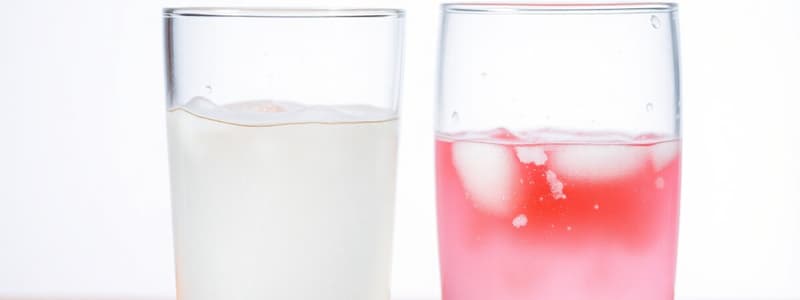Podcast
Questions and Answers
What is the recommended replacement strategy for body water deficit in the first 24 hours?
What is the recommended replacement strategy for body water deficit in the first 24 hours?
- Replace half of the deficit (correct)
- Do not replace any deficit
- Replace one-quarter of the deficit
- Replace all deficit immediately
The ingestion of seawater can lead to a decrease in thirst sensation due to hypertonicity.
The ingestion of seawater can lead to a decrease in thirst sensation due to hypertonicity.
False (B)
What is the formula to calculate body water deficit (L)?
What is the formula to calculate body water deficit (L)?
BW x 0.6 x (measured [Na] - 140) / 140
The maximum urine osmolarity that can be achieved in the kidneys is _____ mOsm/kg.
The maximum urine osmolarity that can be achieved in the kidneys is _____ mOsm/kg.
Match the type of dysnatraemia with the associated drug:
Match the type of dysnatraemia with the associated drug:
What is a potential cause of hypervolemic hypernatremia?
What is a potential cause of hypervolemic hypernatremia?
Renal loss can be a cause of hypovolemic hypernatremia.
Renal loss can be a cause of hypovolemic hypernatremia.
What treatment is suggested for acute diabetes insipidus?
What treatment is suggested for acute diabetes insipidus?
In cases of hypernatremia with sodium levels greater than 160, the recommended treatment solution is __________.
In cases of hypernatremia with sodium levels greater than 160, the recommended treatment solution is __________.
Match the following causes/types of hypernatremia with their corresponding investigations or treatment:
Match the following causes/types of hypernatremia with their corresponding investigations or treatment:
Which of the following is not a cause of euvolemic hypernatremia?
Which of the following is not a cause of euvolemic hypernatremia?
What laboratory findings indicate renal loss of water in hypernatremia?
What laboratory findings indicate renal loss of water in hypernatremia?
A blue tube containing sodium citrate is the appropriate blood collection tube for measuring sodium levels.
A blue tube containing sodium citrate is the appropriate blood collection tube for measuring sodium levels.
Flashcards
Pseudohypernatremia
Pseudohypernatremia
A falsely elevated sodium level in the blood, caused by factors such as using the wrong blood collection tube.
Hypernatremia Cause Investigation
Hypernatremia Cause Investigation
Finding the reason behind high sodium levels, followed by appropriate treatment based on the findings.
Hypervolemic Hypernatremia
Hypervolemic Hypernatremia
High sodium levels with increased overall blood volume, often due to medical interventions (like saline infusions).
Impaired Water Intake Hypernatremia
Impaired Water Intake Hypernatremia
Signup and view all the flashcards
Euvolemic Hypernatremia
Euvolemic Hypernatremia
Signup and view all the flashcards
Diabetes Insipidus
Diabetes Insipidus
Signup and view all the flashcards
Hypovolemic Hypernatremia
Hypovolemic Hypernatremia
Signup and view all the flashcards
Renal Sodium Loss
Renal Sodium Loss
Signup and view all the flashcards
Post-obstructive Uropathy & Urea
Post-obstructive Uropathy & Urea
Signup and view all the flashcards
Sea Water Ingestion
Sea Water Ingestion
Signup and view all the flashcards
What are the different types of dysnatraemia?
What are the different types of dysnatraemia?
Signup and view all the flashcards
What can cause hyponatraemia?
What can cause hyponatraemia?
Signup and view all the flashcards
What can cause hypernatraemia?
What can cause hypernatraemia?
Signup and view all the flashcards
Study Notes
Approach to Hypernatremia
- Ensure correct blood collection tube, as blue tubes (containing trisodium citrate) can falsely elevate sodium levels.
- Investigate the cause of hypernatremia and treat accordingly.
Hypervolemic Hypernatremia
- Category: Sodium gain
- Impaired Water Intake:
- Investigations: Serum osmolality > 300 mOsm/kg
- Treatment: Furosemide 40mg IV + D5
- Causes: Iatrogenic (hypertonic saline/NaHCO3), hyperaldosteronism, impaired thirst, and no access to water
- Euvolemic Hypernatremia:
- Investigations: Serum osmolality < 150 mOsm/kg
- Causes: Diabetes insipidus (DI). no access to water
- Hypovolemic Hypernatremia
- Investigations: Serum osmolality > 300 mOsm/kg
- Causes: Renal loss (osmotic diuresis, extrarenal, increased insensible losses (fever, sweating), diarrhea).
- Causes: Renal loss (osmotic diuresis, extrarenal loss (increased insensible loss - fever, sweating), diarrhea).
Sea Water Ingestion
- Sea water contains 3.5% NaCl (1200 mOsm/kg).
- Hypertonicity triggers a vicious cycle.
- Trigger thirst and ADH, maximally concentrated urine at 1200 mOsm/kg.
Drugs Associated with Dysnatraemia
- Drug-induced hyponatraemia: Diuretics, SIADH (SSRI, carbamazepine, morphine)
- Drug-induced hypernatraemia: Na gain: hypertonic saline, NaHCO3
- Renal water loss: osmotic diuretics (mannitol, glucose), nephrogenic DI (lithium), Central DI (lithium, phenytoin).
Studying That Suits You
Use AI to generate personalized quizzes and flashcards to suit your learning preferences.




